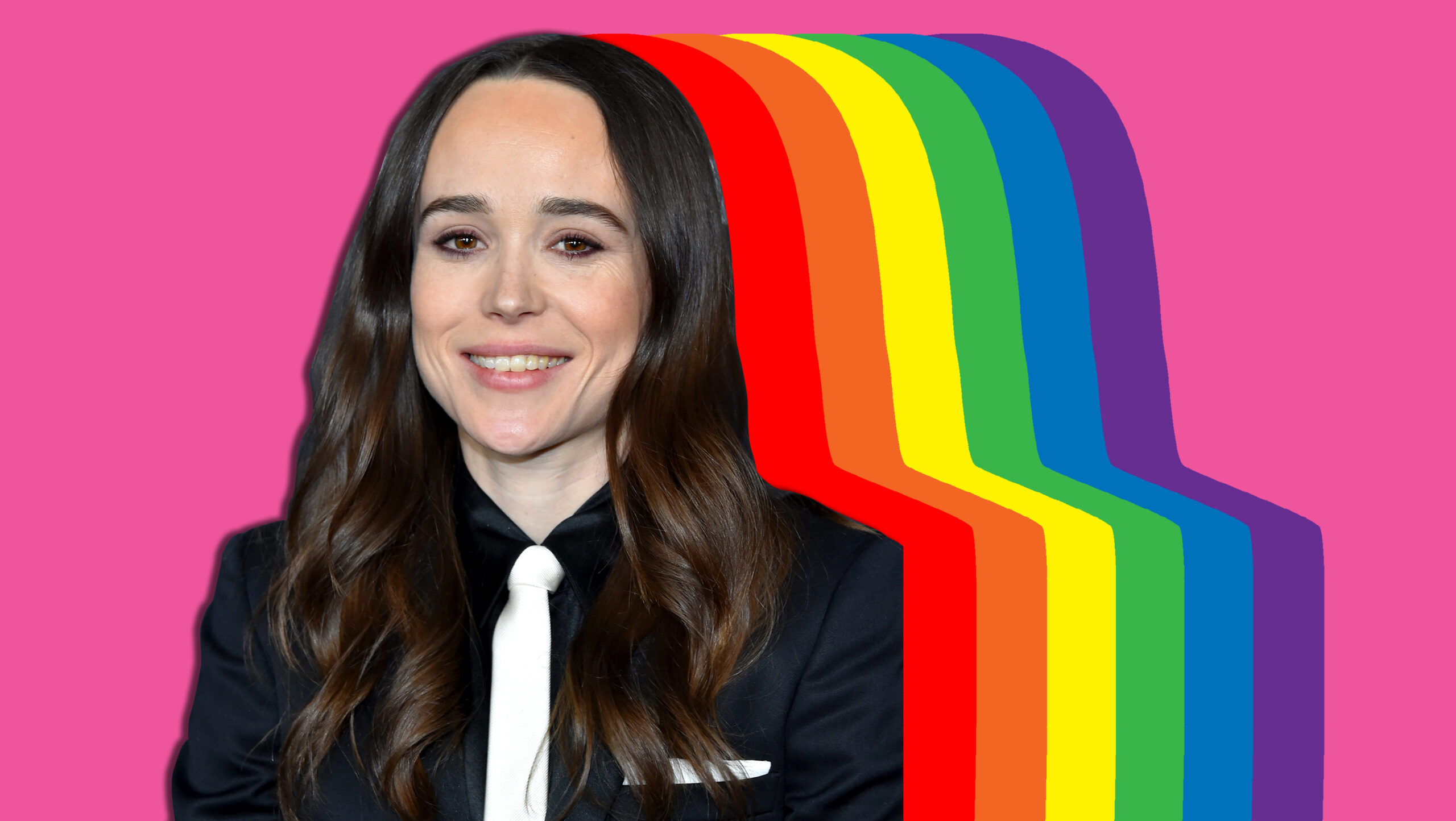As Shawna in Netflix’s new reboot of Tales of the City, Ellen Page enters and leaves spaces as she pleases. She calls her landlady Anna Madrigal — played by Olympia Dukakis here, and in the three previous installments of the series — “old lady.” She is sexually omnivorous, coasting from women to men, to both at once and back again, but never staying for breakfast. The writers’ on-the-nose telegraphing of Shawna’s casual disregard for propriety would be grating if it weren’t for Page’s ability to portray toughness and vulnerability simultaneously — it’s easy to imagine her, as one of her neighbours in the show puts it, as the glue that holds everyone together.
In that respect, Shawna is the heir of Anna, the endearing yet hard-to-know transgender heart of 28 Barbary Lane. A magical, ramshackle haven in San Francisco’s Russian Hill neighbourhood, Anna’s rooming house shelters a motley crew of characters first described in the classic novels by Armistead Maupin — novels upon which the TV series, running intermittently since 1993, is based.
Both characters are central to the action of Barbary Lane, and as central characters often are, they are not necessarily the most captivating part of the ensemble. (That distinction goes to Ysela, played by A Fantastic Woman’s Daniela Vega, who welcomes Anna to San Francisco in a 1960s flashback episode that is the series’ standout.)
No matter. At 32, Page doesn’t need to steal a scene or a show. These days, the most fascinating thing about her isn’t her acting — it’s what her high-profile career allows her to do. Over the past five years, the former child actor from Halifax has deftly alternated between lucrative blockbuster franchises, prestige indies and buzzy TV series, all while doing what few stars have attempted before: working in the industry as an openly gay person, and using her clout to stand up for LGBTQ2 rights at every opportunity. One could argue that what Anna Madrigal is to San Francisco’s misfits is what Ellen Page is to Hollywood’s queer stories: they are aware of their privileged positions and so seek to provide a safe place for the marginalized and dispossessed.
On Valentine’s Day in 2014, Page came out in a way befitting the activist she would soon become: during a speech at the Human Rights Campaign’s inaugural Time to Thrive conference. “I am tired of hiding and I am tired of lying by omission,” she told the crowd. “I suffered for years because I was scared to be out. My spirit suffered, my mental health suffered and my relationships suffered. And I’m standing here today, with all of you, on the other side of that pain.”
Six years earlier, just 21 years old and riding on the surprise success of the coming-of-age comedy Juno for which she’d been nominated for an Oscar, Page hosted Saturday Night Live. During the show, she winked at speculations about her sexuality in a skit with Andy Samberg that had her supposedly straight character rhapsodizing about the Melissa Etheridge concert she’d just attended. But on stage at the HRC event, Page wasn’t looking for laughs: her emotional, eight-minute announcement was orchestrated to bring attention to the well-being of LGBTQ2 youth, a cause about which she cares deeply.
“Some celebrities don’t want their sexual orientation to define them. They never come out or, if they do, they consider it a footnote among many others in the arc of their career.”
Some celebrities don’t want their sexual orientation to define them. They never come out or, if they do, they consider it a footnote among many others in the arc of their career. Erstwhile child star Jodie Foster is Page’s clear predecessor, but much like SNL key player Kate McKinnon, she fiercely guards the details of her private life. American Horror Story stalwart Sarah Paulson is certainly open about her queerness, but seems less scrutinized for it due to her status as a character actor.
And then there’s Page, who has unambiguously doubled down. Having endured years of being told to wear dresses on red carpets, to seem more feminine because that’s what most roles for women require, Page now steps out in slim-fitting suits, skinny ties and ankle boots. Prior to Feb 14, 2014, her work had often been queer-adjacent, but now it’s just plain queer.
Her first project after saying “I am here today because I am gay” was Freeheld, the true story of a New Jersey police detective battling to get her pension transferred to her same-sex partner before her death. Similarly serious-minded, and similarly built around a same-sex love story lined with roadblocks, is her upcoming film, My Days of Mercy. Produced by Page, Kate Mara (who also stars) and legendary lesbian producer Christine Vachon, it tracks the daughter of a death-row inmate who falls for a woman on the opposing side of the capital punishment debate.
But the most obviously queer project remains her two seasons hosting Gaycation, a documentary series filmed for Viceland in 2016 and 2017. In it, Page and her best friend Ian Daniel delve into LGBTQ2 life around the world. The show has its drawbacks: watching two cisgender white Americans travel to other countries on a “gay vacation” to exclaim over how different things are can be discomfiting, but it’s impossible to deny the electric effect of an interview with a cop in Brazil who is proud of having murdered gays because they are “worse than animals”— or not to laugh along with a man in Japan who bemusedly points out that “what doesn’t kill you only makes you gayer.” Gaycation may be a travel show, but it’s also 10 hours’ worth of footage of LGBTQ2 stories from across the globe, available on a mainstream platform. No one else is doing that.
This past February, Page — who’d previously starred in 2006’s X-Men: The Last Stand and 2014’s X-Men: Days of Future Past — returned to the world of comic-book adaptations with the release of the Netflix series The Umbrella Academy. An X-Men–style series about mysterious children raised to be superheroes, it features Page as Vanya, the only powers-less member (or so she thinks) of a powers-full family. An outcast, Vanya struggles to figure out where she belongs.
“You don’t need to break a sweat to unearth the queer metaphors in Page’s work.”
You don’t need to break a sweat to unearth the queer metaphor there, or in the show’s close cousin, X-Men (Page’s character in the latter is a mutant who can phase through objects and people, and is called Kitty Pryde). The actor copped to her subtext-filled canon in a recent interview with Out magazine, positing that many of her characters grew up to be lesbians. Certainly, when looking back over her earlier roles — which include the hoodie-wearing vigilante Hayley Stark in Hard Candy, the droll and pregnant titular teen in Juno and the wannabe jammer Bliss Cavendar in Whip It, a movie about roller derby (GAY!) — it’s hard to argue with her.
But coded language and behaviour are no longer Page’s mainstay. Professionally, she’s in good company now, much more so than when she first came out. Her own shepherding of queer stories has coincided with a rise in LGBTQ2 content, particularly in TV, with critically-acclaimed shows such as Orange Is the New Black and Pose taking up space — to say nothing of queer female producers and showrunners like Tanya Saracho (Vida), Angela Robinson (the L Word) and Lena Waithe (The Chi).
Over the past five years, Page has made up for lost time not just in her career but in her personal life. She was single when she officially came out, but that didn’t last long: first there was Samantha Thomas, an artist and surfer who accompanied the actor on red carpets from 2015 to 2017. Next was choreographer and dancer Emma Portner, whom she married in 2018 after six months of dating.
While Page’s relationship with Thomas was relatively low-key, its impact was not. Through it, the world saw a successful member of young Hollywood basking in queer joy, proof that being out and partnered and bankable — the trifecta — was indeed possible. With Portner, Page has upped her romantic profile: the pair appears both deliriously happy and well matched, showing up in each other’s social media at premieres and in choreographies. Sample gushing: “My beautiful, brilliant, compassionate wife. Your contributions to this world are constant and countless. I am so grateful. I love you forever.” (Portner to Page, after the latter appeared on the cover of The Observer Magazine.) “Beyond grateful to all those who fought to allow us to be wife & wife. I love this magical human. I’m so fucking lucky.” (Page about Portner, following their one-year anniversary.) These declarations — and this photo of the couple in a topless embrace to celebrate Pride — aren’t banal: even in 2019, examples of famous people expressing queer love and physicality are hard to find.
Toughness and vulnerability. It’s a high-wire act for anyone who’s internalized the idea that crying — admitting to pain or hurt or anger — is giving the bullies exactly what they want. But as Shawna — and Anna Madrigal — demonstrate over the course of Tales of the City, cutting yourself off from your emotions gets you next to nowhere in the long run. It’s showing the world who you are, whatever that means for you, that is the best way through. Page herself is at her toughest when she’s most open, as she was when her voice quavered during her coming-out speech; when she wrote an op-ed for the Hollywood Reporter about hate crimes; when she teared up while calling out US vice president Mike Pence’s homophobia and transphobia on the Late Show With Stephen Colbert. “I am lucky to have the time and the privilege to say this,” she told the host in February 2019. “This [discrimination against LGBTQ2 communities] needs to fucking stop.”
“The film industry is just so binary and can be narrow in its ideas of who can tell stories and who can be in the stories. I hope it continues to change.” — Page to Stephen Colbert
Page’s commitment to speaking up, to defending the rights of gay, queer and trans folks, to being a kind of Barbary Lane, is relentless. And she’s willing to push back as many times as necessary against the very industry that has had a hand in shaping who she’s become. “Honestly, I really think we need to hurry up. It’s not cutting it,” she told Colbert when he asked if Hollywood has become more progressive. “The film industry in particular is just so binary and it can be narrow in its ideas of who can tell stories and who can be in the stories. I hope it continues to change.”
During her climb to fame, Page listened to Hollywood power players who told her to present as feminine. Had she not, would she have been allowed to star in blockbusters like X-Men and Inception, or been nominated for an Oscar for Juno? There’s no way to know. But one thing is certain: after coming out, her celebrity footprint has only gotten larger — and her red-carpet appearances remarkably frock-free.
Ellen Page is done ceding the point. She’s shown that you can risk it all and win the game and the girl. Now she wants to make sure other actors, producers and creators know that too. No more compromises.


 Why you can trust Xtra
Why you can trust Xtra


